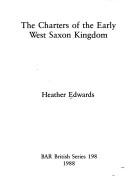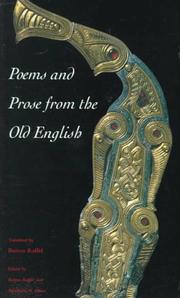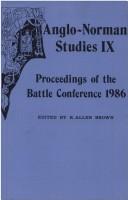| Listing 1 - 10 of 102 | << page >> |
Sort by
|

ISBN: 086054589X Year: 1988 Volume: vol 198
Abstract | Keywords | Export | Availability | Bookmark
 Loading...
Loading...Choose an application
- Reference Manager
- EndNote
- RefWorks (Direct export to RefWorks)
Anglo-Saxons --- Sources.
Book
ISBN: 1782975314 1782975292 9781782975298 Year: 2008 Publisher: Oxford
Abstract | Keywords | Export | Availability | Bookmark
 Loading...
Loading...Choose an application
- Reference Manager
- EndNote
- RefWorks (Direct export to RefWorks)
Anglo-Saxon Studies in Archaeology and History is an annual series concerned with the archaeology and history of England and its neighbours during the Anglo-Saxon period. ASSAH offers researchers an opportunity to publish new work in an interdisciplinary and multi-disciplinary forum which allows for a diversity of approaches and subject matter. Contributions focus not just on Anglo-Saxon England but also its international context.
Anglo-Saxons --- Saxons --- Antiquities.
Book
ISBN: 0860543331 Year: 1985 Publisher: Oxford BAR
Abstract | Keywords | Export | Availability | Bookmark
 Loading...
Loading...Choose an application
- Reference Manager
- EndNote
- RefWorks (Direct export to RefWorks)
Anglo-Saxons --- Pottery, Medieval --- Catalogs.
Book
ISBN: 0300195370 9780300195378 9780300125344 0300125348 9780300216134 0300216130 Year: 2013 Publisher: New Haven Yale University Press
Abstract | Keywords | Export | Availability | Bookmark
 Loading...
Loading...Choose an application
- Reference Manager
- EndNote
- RefWorks (Direct export to RefWorks)
The Anglo-Saxon period, stretching from the fifth to the late eleventh century, begins with the Roman retreat from the Western world and ends with the Norman takeover of England. Between these epochal events, many of the contours and patterns of English life that would endure for the next millennium were shaped. In this authoritative work, N. J. Higham and M. J. Ryan reexamine Anglo-Saxon England in the light of new research in disciplines as wide ranging as historical genetics, paleobotany, archaeology, literary studies, art history, and numismatics. The result is the definitive introduction to the Anglo-Saxon world, enhanced with a rich array of photographs, maps, genealogies, and other illustrations. The Anglo-Saxon period witnessed the birth of the English people, the establishment of Christianity, and the development of the English language. With an extraordinary cast of characters (Alfred the Great, the Venerable Bede, King Cnut), a long list of artistic and cultural achievements (Beowulf, the Sutton Hoo ship-burial finds, the Bayeux Tapestry), and multiple dramatic events (the Viking invasions, the Battle of Hastings), the Anglo-Saxon era lays legitimate claim to having been one of the most important in Western history.
Anglo-Saxons. --- Great Britain --- History
Book
ISBN: 1842175548 9781842175545 Year: 2011 Publisher: Havertown Oxbow Books
Abstract | Keywords | Export | Availability | Bookmark
 Loading...
Loading...Choose an application
- Reference Manager
- EndNote
- RefWorks (Direct export to RefWorks)
The county of Somerset cannot lay claim to have been an Anglo-Saxon kingdom like Kent or Sussex, but nevertheless it has a history as a distinct region which can be traced to the seventh century and there are hints of an earlier entity in the post-Roman period. Although the detail of this society is difficult to recover, there is no doubt that it was successful in maintaining its independence for over two centuries before it was over-run by the Anglo-Saxons from the east. On the edge of the highland zone, with its diverse topography, newly conquered Somerset provided the early Anglo-Saxon king
Anglo-Saxons --- Somerset (England) --- History.
Book
ISBN: 0860545474 Year: 1988 Volume: vol 191
Abstract | Keywords | Export | Availability | Bookmark
 Loading...
Loading...Choose an application
- Reference Manager
- EndNote
- RefWorks (Direct export to RefWorks)

ISBN: 9786611730611 1281730610 0300130414 9780300130416 9780300069945 0300069944 9780300069952 0300069952 6611730613 9781281730619 Year: 1998 Publisher: New Haven Yale University Press
Abstract | Keywords | Export | Availability | Bookmark
 Loading...
Loading...Choose an application
- Reference Manager
- EndNote
- RefWorks (Direct export to RefWorks)
In this restructured and greatly expanded version of Burton Raffel's out-of-print classic, Poems from the Old English, Raffel and co-editor Alexandra H. Olsen place the oldest English writings in an entirely different perspective. Keeping the classroom teacher's needs foremost in mind, Raffel and Olsen organize the major old English poems (except Beowulf) and new prose selections so as to facilitate both reading and studying. A general introduction provides an up-to-date and detailed historical account of the Anglo-Saxon period, and concise introductions open the literature sections of the book and many of the translations.Raffel's masterly translations of Old English poetry, praised as fine poems in their own right, reproduce much of the flavor as well as the sense of the originals. With more than 1800 newly translated lines and many revised older translations, the poems in this volume are organized into four genres-elegies, heroic poems, religious poems, and wisdom poetry. Raffel's new translations include more than twenty poem-riddles, with proposed solutions in a separate section. Prose translations-grouped in historical, testamentary and legal, religious, social and instructional, and medical and magical categories-feature writings by King Alfred, Aelfric, and Wulfstan, among others.

ISBN: 9781846151910 085115476X 1281949418 1846151910 9786611949419 Year: 2023 Publisher: Woodbridge The Boydell Press
Abstract | Keywords | Export | Availability | Bookmark
 Loading...
Loading...Choose an application
- Reference Manager
- EndNote
- RefWorks (Direct export to RefWorks)
Aquitainian Participation in the Conquest; Stereotype Normans in Vernacular Literature; Byzantine Marginalia to the Norman Conquest; Norman Architectural Patronage; Domesday Book and the Teneurial Revolution; Henry of Huntingdon and Historia Anglorum; Domesday Inquest and Land Adjudication; Abbey of Cava; Post-Conquest Attitudes to the Saints of the Anglo-Saxons; Danish Geometrical Viking Fortresses; Holy Face of Lucca. G. BEECH, M. BENNETT, K. CIGGAAR, E. FERNIE, R. FLEMING, D. GREENWAY, P. HYAMS, G.A. LOUD, S.J. RIDYARD, E. ROESDAHL, D. WEBB.34 plates, figs.
Normans --- Great Britain --- History --- Anglo-Saxons
Book
ISBN: 9789048544967 9789463729314 9048544963 Year: 2021 Publisher: Amsterdam Amsterdam University Press
Abstract | Keywords | Export | Availability | Bookmark
 Loading...
Loading...Choose an application
- Reference Manager
- EndNote
- RefWorks (Direct export to RefWorks)
For centuries, archaeologists have excavated the soils of Britain to uncover finds from the early medieval past. These finds have been used to reconstruct the alleged communities, migration patterns, and expressions of identity of coherent groups who can be regarded as ethnic 'Anglo-Saxons'. Even in the modern day, when social constructionism has been largely accepted by scholars, this paradigm still persists.
This book challenges the ethnic paradigm. As the first historiographical study of approaches to ethnic identity in modern 'Anglo-Saxon' archaeology, it reveals these approaches to be incompatible with current scholarly understandings of ethnicity. Drawing upon post-structuralist approaches to self and community, it highlights the empirical difficulties the archaeology of ethnicity in early medieval Britain faces, and proposes steps toward an alternative understanding of the role played by the communities of lowland Britain - both migrants from across the North Sea and those already present - in transforming the Roman world.
Anglo-Saxons --- Ethnicity --- History --- Great Britain --- Antiquities.
Book
ISBN: 0714113441 9780714113449 9780714113432 0714113433 Year: 1979 Publisher: London: British Museum,
Abstract | Keywords | Export | Availability | Bookmark
 Loading...
Loading...Choose an application
- Reference Manager
- EndNote
- RefWorks (Direct export to RefWorks)
Anglo-Saxons --- Excavations (Archaeology) --- Anglo-Saxons --- Ship burials --- Sutton Hoo Ship Burial (England) --- Suffolk (England)
| Listing 1 - 10 of 102 | << page >> |
Sort by
|

 Search
Search Feedback
Feedback About UniCat
About UniCat  Help
Help News
News